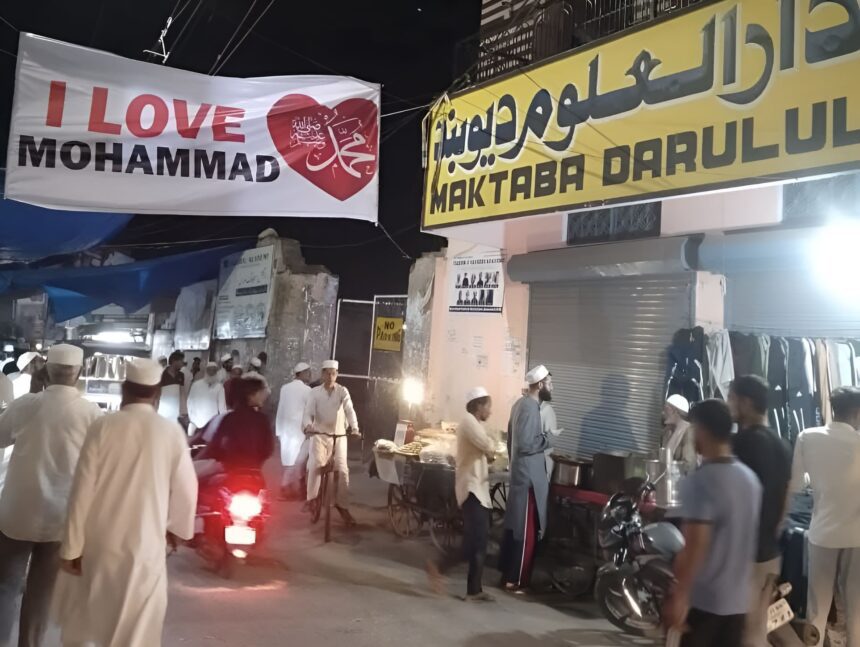A series of campaigns under the banner “I Love Muhammad” has emerged across various Indian cities following a legal complaint filed by Kanpur police against several individuals associated with a signboard featuring the same phrase during a recent Barawafat procession.
The FIR registered in the Rawatpur area of Kanpur accused participants of provoking communal discord by displaying the slogan. This move has faced backlash from activists, scholars, and community members, who argue that the phrase symbolizes devotion and respect for Prophet Muhammad rather than incitement.
The campaign has gained significant momentum, with images of the slogan proliferating on walls, placards, and social media. Rights organizations have called for the cancellation of the FIR, deeming it legally unfounded and socially polarizing.
In Bareilly, Uttar Pradesh, Jama Masjid’s Imam, Mufti Khurshid Alam, encouraged congregants after Friday prayers to put up “I Love Muhammad” posters at their homes. He stressed the imperative of expressing affection for the Prophet, noting that such displays convey messages of peace and love. “The move is a protest against the arbitrary actions taken by the Kanpur police against those who publicly expressed their love,” he asserted.
Alam questioned, “If tomorrow I express my love towards a relative, will it become grounds for persecution? Is loving someone a crime?” He reinforced that the affection for Muhammad is deeply rooted and will endure, stressing that efforts to curb such expressions will only amplify them. He invited all Muslims to engage in the campaign in any manner they choose.
Following his appeal, numerous “I Love Muhammad” flags have appeared throughout Bareilly, marking an expanding movement. Maulana Tauqeer Raza held a public gathering and press conference reiterating the same sentiment. He expressed that Muslims globally are prepared to make sacrifices for their Prophet and voiced concerns over perceived governmental failures to protect community rights, particularly in light of the National Register of Citizens (NRC) and Citizenship Amendment Act (CAA) processes.
On September 21, in response to the FIR regarding the slogan, worshippers gathered outside Hari Masjid in Kutubkhana, Bareilly, led by Maulana Syed Amir Miyan. Protesters voiced their disapproval of such legal actions, calling on authorities to cease FIR registrations against peaceful expressions of love for the Prophet. They denounced the complaint lodged against the Kanpur followers, highlighting that the Muslim community has never taken issue with the religious displays of other communities.
Amir Miyan posed, “Since when has expressing love for our Prophet become a crime?” He emphasized that Prophet Muhammad transmitted a universal message of love and peace for humanity.
Parallel to these physical campaigns, social media platforms are abuzz with individuals and groups echoing the slogan “I Love Muhammad,” altering display pictures across various platforms as a gesture of affection toward the Prophet. A rally occurred in Mumbra, Mumbai, where members of the Muslim community braved rain to express their devotion.
Incidents of police intervention persist. In Godhra, Gujarat, police reportedly paraded Muslim youths publicly for posting a reel featuring the slogan. One youth, Zakir Jhabha, allegedly faced police assault for sharing the video, prompting local youths to gather outside the police station in protest. This led to a crackdown, with 17 arrests and 88 individuals booked following an FIR.
Youth groups, religious organizations, and academics across different states are launching peaceful initiatives, including posters, banners, and social media campaigns reiterating “I Love Muhammad.” This is perceived as an assertion of faith and a stance against what many consider the criminalization of religious expression.
AIMIM chief Asaduddin Owaisi expressed solidarity on social media, stating, “I LOVE MOHAMMAD. This is not a crime.” He articulated a personal connection to the Prophet, asserting willingness to accept the consequences of expressing such love.
Wali Rahmani, an academic, conveyed that the affection for Prophet Muhammad is central to the Muslim identity. He lamented the difficulty many face in openly expressing this sentiment and commended the community’s unity in responding to the Kanpur incident with a resounding “I love Prophet Muhammad.” He concluded by stressing the need for actionable measures to ensure respect for the Prophet’s name and foster continuous expressions of this communal love.
Tags: I Love Muhammad, campaigns India, UP Police FIR, Kanpur, religious tolerance
Hashtags: #Love #Muhammad #campaigns #spread #India #Police #FIR #Kanpur










